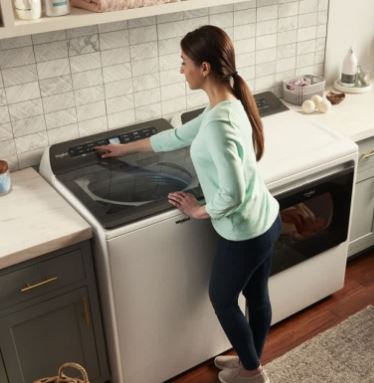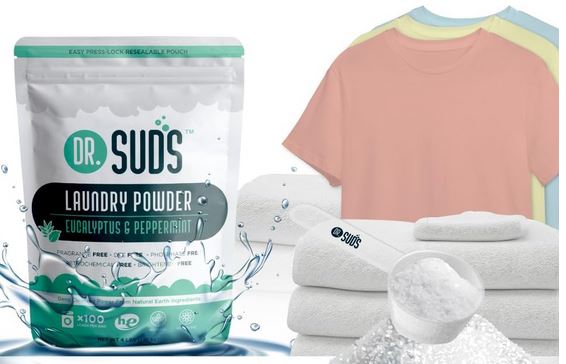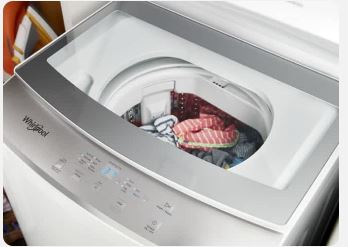You may want to run cold water on your washer for different reasons. For example, you could wish to reduce energy costs or bypass a failed water heater. And if so, you may want to know whether you can run a washing machine with just cold water.
Yes, you can run your washing machine with just cold water. After all, many washing machines are cold-filled, meaning they run on cold water, and those that aren’t usually are hot-filled, meaning they run on both cold and hot water.
It’s crucial to consider the detergent, fabric type, bleeding potential, and climatic conditions when deciding to run the cold water cycle only. That’s because cold water favors cold-water biological detergents, delicate fabrics that don’t bleed/fade, and less chilly conditions.
I’ll discuss all these factors to tell you when to use cold water alone. I’ll also compare the pros and cons of using hot and cold water for your laundry. So, let’s dive in!

Can You Use a Washer with Only Cold Water?
Generally, you can use a washer with only cold water for several reasons. First, most washing machines are hot-filled, with cold and hot water supply hoses.
In that case, the washer offers you the option of using only cold water or both hot and cold water. You can even turn off the heater to save energy costs with such possibilities.
But still, many washers nowadays are cold-filled, meaning they supply cold water. These washers are designed to heat their water and store it. So, they don’t need heated water from a different source as they are self-reliant.
With that in mind, you can run a washing machine with cold water. It’s essential, however, to consider these four factors:
1. Detergent Type
Cold water is best when using cold water laundry detergent (View on Amazon) to do your laundry, which applies to the washing machine. If you use a hot-water detergent, the chances are it won’t work with the water, and your clothes may fail to wash.
2. Fabric Type
Not all fabrics are ideal for washing with cold water. Cold water is best for delicate fabrics, including silk, acrylic, linen, lace, and wool. In particular, consider it when washing blouses, t-shirts, light summer wear, undergarments, and bras.
However, the clothes may fail to clean if you use cold water on thick, sturdy fabrics. Such options require the aggression of hot water and the effectiveness of a hot-water detergent.
3. Fabric Bleeding Potential
Cold water won’t bleed your clothes, making it perfect for colorful and dark-colored options. So, if you intend to run your washing machine with cold water, these should be the type of clothes to wash.
4. Climatic Conditions
Cold water does well when the climatic conditions are less chilly. In such situations, the chances of denaturing the detergent are lower, and that only improves the detergent’s effectiveness.
Cold Water Vs. Hot Water for Washing Machine Compared
Both cold and hot water have their fair share of pros and cons when using the washing machine. Let’s compare them:
· Fabric type
You should use cold water when washing delicate fabrics such as silk, acrylic, linen, lace, and wool. However, consider using hot or warm water to clean the slightly sturdy and hard-to-clean material, especially synthetics like spandex, polyester, nylon, or rayon.
· Fabric bleeding potential and color
If the fabric is bleeding-prone, especially colorful and dark-colored options, it’s best to use cold water. If you use hot water in such a case, the chances of the clothes fading are very high.
· Detergent type
Laundry detergents aren’t the same. Some work better with cold water, while others are best for hot/warm water. If you want to use cold water with your washing machine, it’s advisable to apply col-water detergent, and if it’s hot water, you should use hot-water detergent.

· Energy efficiency
Ideally, you need electricity to heat water and use it in your washing machine. So, if you are looking for an energy-efficient way to run your washing machine, you should use cold water. However, you can use hot water if you don’t focus on energy efficiency but on washer performance.
· Action
Cold and hot water have varying actions, especially regarding washing speed and stain removal. Cold water isn’t the fastest nor the most effective for removing tough stains. That contrasts hot water, which acts fast and can remove the hardest stains.
· Effect on cloth (damage and shrinking)
Hot water is likely to cause shrinkage and even damage to delicate fabrics. That’s, however, not the case with cold water, which is gentler and will likely preserve the fabric. Therefore, you should use hot water only when dealing with sturdier materials, as they are less susceptible to shrinkage and damage.
In summary, cold water is best when using the washing machine under these situations:
- Washing delicate fabrics
- Washing fabrics that are fade-prone
- Using cold-water detergents
- Doing laundry under less freezing conditions
- Washing off less hardened stains on fabric
In contrast, hot water is ideal for using the washing machine under these situations:
- Washing sturdier and tougher fabrics
- Washing less fade-prone fabrics
- Using hot-water detergents
- Doing laundry in freezing conditions
- Washing off hardened stains on fabric
Does A Washing Machine Need Hot Water?
If you have a cold-filled washing machine with only one supply line for cold water, you may wonder if it requires hot water. Well, it’s not necessary in such a case as washers heat their water and store it to use it when necessary. So they don’t require heated water from another source.
However, your washer needs hot water if you have a hot-filled washing machine with hot water and cold water supply lines. The word is ‘need,’ but you can still turn off the heater and run cold water alone to save energy.
Can You Run a Washer with Just Hot Water?
Though most washers have hot water and cold-water fill lines, you shouldn’t run hot water alone. If you do, the chances are that the heat from the hot water will damage the hose or even the washing machine.
Ideally, these fill hoses are designed to allow cold water to run fast; if you only run hot water, the effects could be dire.
What Happens If You Only Have Cold Water for Laundry?
Whether cold-filled or hot-filled, washing machines are intended to run on cold water. Cold-filled washers allow you to run the cold water cycle alone, making it easy to do your laundry under less freezing conditions without worrying about damaging or bleeding the fabric.
On the other hand, hot-filled washers allow you to turn off the heater and only run cold water when necessary. So, cold water won’t stop you from doing your laundry.

But Should A Washing Machine Be Connected to Hot or Cold Water?
If your washing machine comes with hot and cold water fill, connect it to hot and cold water. That’s unless you intend to save on heating costs, where you can turn off the heater to allow both fill lines to run on cold water.
You, however, shouldn’t interchange the fill lines. The hot-water fill line (ordinarily red) should be connected to hot water, and the cold-water fill line (typically blue) should match its corresponding water line.
People Also Ask
1. What Happens If You Run a Washing Machine Without Water?
A washing machine is not intended to run without water. It needs water to run. Though the lack of water won’t stop the washing machine from starting or powering on, it won’t run, so you can’t wash your clothes.
And even if it starts running, it’ll stop as soon as it senses the lack of water. The most severe effect is that running the washing machine without water may damage it, and you don’t want that.
2. Can A Washing Machine Run Without Water?
Most washing machines may start or power up without water, but they won’t run. If they do, they shut down as soon as they realize there’s no water, which means you cannot do much laundry. But more seriously, you shouldn’t run a washing machine without water because it can be damaging.
3. Can You Connect to The Cold Water Only On a Washing Machine?
Yes, you can only connect to the cold water on a washing machine. In fact, most people do that to save on heating costs. The only caveat is that you should use a cold-water detergent for better results and preferably wash fade-prone and delicate fabrics.
4. Do You Need Hot Water to Run a Washing Machine?
No, you don’t necessarily need hot water to run a washing machine. If your washing machine is cold-filled, you can count on it to heat its water, eliminating the need for a hot water supply from a different source.
5. Can I Turn Off Hot Water to Washing Machine?
You can turn off the hot water supply to your washing machine. Most hot-filled washer users do that to save on heating costs and when the heater fails. The only issue is that you won’t get good results if you wash off stubborn dirt, especially on sturdy fabrics.
6. Why Do Washing Machines Only Use Cold Water?
No, not all washing machines are cold-filled. Some are hot-filled, which means they use both cold and hot water. However, most owners prefer to shut off the heater to run cold water only to save on heating costs. So, it depends on whether you have a cold-filled washer (which runs on cold water but can heat it) or a hot-filled (which runs on both hot and cold water).
In summary, can you run a washing machine with just cold water?
We’ve seen that running a washing machine with just cold water is possible regardless of the washer type. If it’s a cold-filled washer, all you’ve to ensure is that you use cold-water detergent, the fabrics are delicate and preferably fade-prone, and the conditions are less freezing.
And if it’s a hot-filled washer, you can turn off the heater to run the cold cycle alone. But again, that works under the conditions I’ve mentioned for the cold-filled washer.
Also Read:
